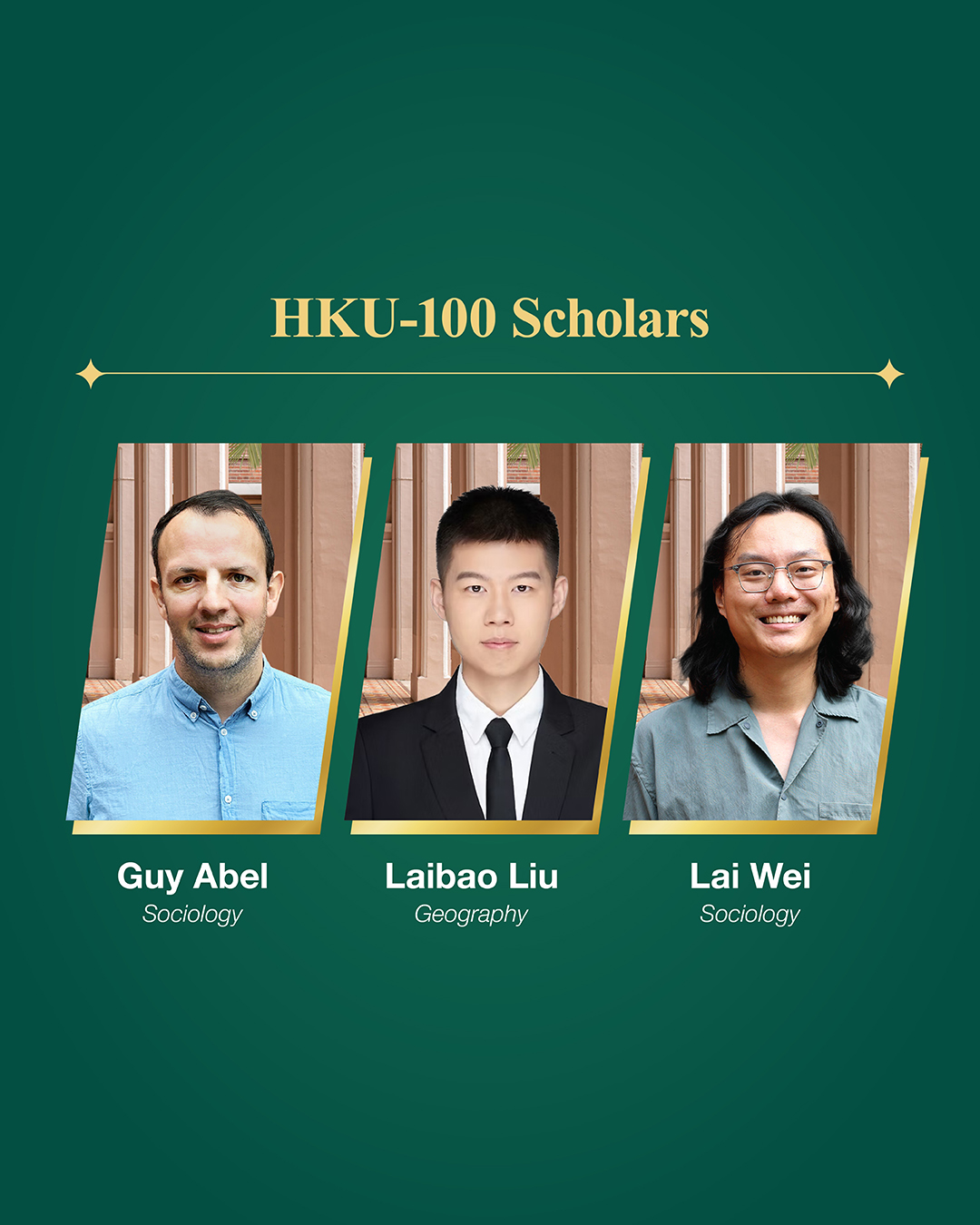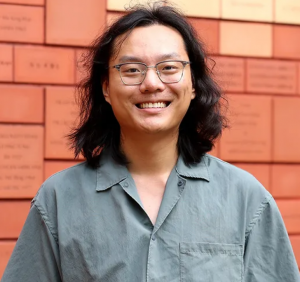Elevating Academia: Introducing Our HKU-100 Scholars

We are thrilled to announce that three distinguished faculty members, Professors Guy Abel and Lai Wei from Sociology, and Professor Laibao Liu from Geography, have recently been awarded the prestigious title of “HKU-100 Scholar” by the University.
The HKU-100 initiative is a global professoriate recruitment campaign launched by the University, aiming to recruit 100 outstanding academics in emerging fields who have the potential for scientific and scholarly breakthroughs, going beyond the University’s existing professoriate recruitment program. As HKU-100 Scholars, our honoured faculty members embody this potential, exemplifying the University’s commitment to fostering a dynamic and intellectually stimulating environment. Join us as we explore their inspiring journeys and read firsthand their thoughts on being part of this transformative initiative.

Guy Abel
Professor, Department of Sociology
Being recognised as a distinguished HKU-100 scholar is both an honour and a motivation. Despite migration’s profound role in shaping societies, the measurement of migration is frequently overlooked in social science research, where attention tends to focus on economic, political, or sociological dimensions in a particular country or region. This recognition underscores my belief in the importance of developing methods to effectively measure migration across a network of places, thereby providing more informed insights for both academic discourse and policy decisions.
My work focuses on developing statistical techniques to quantify migration flows and analyse their variation across demographic dimensions such as age, sex, and educational attainment. The HKU-100 support provides invaluable opportunities to deepen this research, particularly in addressing gaps in migration data. A key initiative involves constructing comprehensive databases of past and existing migration statistics, which are frequently collected and published by different statistical bodies in disparate formats. Combining and standardising these datasets is essential for enabling comparisons and identifying meaningful patterns in migration trends.
Additionally, many countries lack migration data entirely due to the prohibitive costs of monitoring population movements. Even when data is available, significant challenges arise, including publication delays and inconsistencies in measurement that hinder real-time analysis and our ability to understand previous migration patterns. My research aims to refine methods for integrating fragmented data sources to predict migration patterns of the past and present under a consistent definition.
Interdisciplinary collaboration is crucial for advancing research, particularly in data-intensive fields. HKU’s academic environment presents unique opportunities to engage with scholars specialising in Demography, Data Science, and Big Data, fostering joint efforts to refine migration models and advance statistical methods. By integrating expertise across disciplines, we can develop more comprehensive frameworks that enhance the study, measurement, and interpretation of migration, ultimately leading to more effective applications in research, policy, and global migration discourse.
 Laibao Liu
Laibao Liu
Assistant Professor, Department of Geography
It is a great honour to be recognised as one of the HKU-100 Scholars. This recognition not only acknowledges my previous work but also serves as a strong positive reinforcement to continue pursuing my research goals. I extend my sincere appreciation to the University for this honour.
My research aims to improve our understanding of climate change and achieve climate-resilient and sustainable development by advancing carbon neutrality from both the carbon sink and source perspectives. The support from HKU-100 will significantly bolster my research work in these areas, which require substantial human and computational resources.
The field of climate research is rapidly evolving. While “CO2 emissions” has been a hot topic for decades, I foresee “CO2 removal” emerging as a new focus soon. It is obvious that cutting emissions alone is not sufficient to limit global warming to well below 1.5 or 2 degrees Celsius. CO2 removal technologies are increasingly regarded as inevitable climate mitigation options. We have many choices, such as Bioenergy with Carbon Capture and Storage (BECCS), Ocean Alkalinity Enhancement (OAE), and Enhanced Weathering on Land (EWL). Determining which is most effective and economical, and whether large-scale deployment can fully reverse climate change, are critical questions with global implications. We are collaborating with some European scientists to address these questions through unprecedented and novel earth system model simulations, expected to be released this summer.
My research relies heavily on big data, such as climate or earth system model simulations, which can require data storage at the petabyte (PB) level. Although my background is not in data science, I am excited to learn that HKU has many colleagues specialising in Data Science and Big data, and I am enthusiastic about collaborating with them. I hope to utilise AI to develop more efficient climate projections.
 Lai Wei
Lai Wei
Assistant Professor, Department of Sociology
I am absolutely thrilled and feel truly honoured to be recognised as one of the HKU-100 Scholars. I consider this a major recognition of my work, and I will make sure to put the resources to good use to facilitate my research.
My research agenda involves using computational and causal approaches to study social inequality. Specifically, several of my ongoing studies include: 1. Developing and applying causal inference techniques to assess the possible policy consequences on reducing inequality, such as racial inequality in wealth, or gender inequality in wages; 2. Using big data, including texts from job advertisements, to understand the evolution of job market skill demands and how these job market trends affect the income of workers from various demographic backgrounds; 3. Exploring ways to use large language models to improve the efficiency of survey-based research. The generous support from the HKU-100 Scheme will help me in purchasing data, hiring research assistants, and covering API costs for using large language models and other AI tools.
My studies contribute to two cutting-edge directions of the study of social inequality and social stratification, specifically the application of causal inference techniques and computational tools. Conventionally, social inequality studies excel at describing the patterns of inequality, but are less equipped to provide rigorous evidence-based policy suggestions. I have been developing methods for evaluating the consequences of hypothetical policies specifically designed for the goal of inequality reduction. With the rise of large language models, researchers have been increasingly interested in whether and to what extent large language models may help with survey research to improve our understanding of public opinions and socio-economic dynamics. I plan to develop tools and test how large language models may improve the efficiency of traditional survey research.
My studies lie at the intersection of sociology and data science/statistics, focusing on combining statistical methods with the study of social inequality. I am eager to collaborate with colleagues from related disciplines on these topics to broaden my research context and enhance the University’s research excellence.
About HKU-100: https://www.prof-scholars.hku.hk/